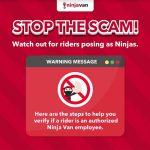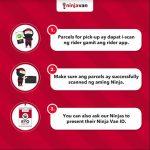MANILA, PHILIPPINES —The holiday season is almost here and with it comes sales, sales, and more sales! Whether it is in the mall or on your favorite e-commerce platforms, now is the perfect time to start looking for Christmas gifts for your loved ones (and yourself, too!).
On top of amazing price deals and a wide array of product selections, online shopping continues to be preferred by many because of the convenience it offers. However, some people tend to take advantage of the increased online shopping activity, especially during sale seasons, to scam innocent shoppers out of their money.
As stories of courier and shipping scams become more rampant on social media these days, Ninja Van Philippines has listed down some of the common tactics used by delivery scammers and ways to keep them at bay to ensure a safer online shopping experience, especially during holiday sales.
Courier and shipping scams
COD scams
While there is an increase in the number of Filipinos that use digital payment methods over the past year, cash-on-delivery (COD) is still the preferred mode of payment for consumers in the Philippines when it comes to purchasing online. This is mostly attributed to the fact that many want to ensure the product’s condition first before paying for it.
However, scammers are now finding ways to use COD payment for their own gain. Usually, their tactics involve luring individuals or family members who assist to receive on behalf of customers to pay in cash for parcels that they did not buy or did not match their expected purchases. To appear more convincing, they pose as legitimate online sellers on their fake websites or place fake ads on social media.
How to avoid it?: Ninja Van Philippines advises the public to be extra vigilant when it comes to receiving deliveries. Double-check if the parcel matches the order ID on your mobile app and reject payment if anything seems suspicious. If you are expecting a parcel that requires COD, let your family members know what it is and when to expect them just in case you are not able to receive them yourself.
Fake contests
Have you ever got a random message or a call saying that you won a certain raffle and that in order to receive your prize, you need to pay the shipping fee upon delivery? Before you get all too excited, it is best to first check the legitimacy of these claims because this is another modus operandi that scammers often use to trick unsuspecting individuals.
How to avoid it?: If it’s too good to be true then it must be a fraud, especially if you don’t remember joining any raffles or contests. To be sure, you can always contact the organiser that’s holding the promotion to inquire. This is also a great way to inform them if any scammers are using their names for illegal means. Lastly, raffles and contests run by legitimate companies will not require you to pay any sort of fee to claim your prize, so that can be your biggest indicator.
Phishing links
Scammers are now also adept at using technology to trick people. They send text messages or emails saying that you have a delivery to confirm or to pick up at the post office, which contains a “confirmation” link that will unknowingly redirect you to a phishing website. These websites use URLs that look similar to those of reputable couriers. These sites will request for you to input your personal information including your banking details to supposedly pay the handling fee of your package.
How to avoid it?: When you get sketchy text messages or emails from unknown sources, do not download attachments or click on links, especially if they ask for your personal data such as well as OTP codes. Make it a point to always verify the sender’s email address and check the website URL carefully before inputting any information.
Other tips
Another thing you should be wary of is riders posing as employees of different courier companies to lure people into paying for things they did not order. Ninja Van Philippines is urging its customers to stay vigilant and always verify if you’re transacting with an authorized Ninja before receiving delivery or giving any forms of payment.
After receiving your parcels, dispose of your airway bill (AWB) properly to protect your personal data by cutting it up, wetting it and rubbing out the details, or crossing out your personal information, QR code, and the barcode with a marker.
To protect both its shippers and shoppers, Ninja Van Philippines Philippines has been working closely with relevant stakeholders to tackle these scams. If you ever come across any suspicious parcels or payment requests using Ninja Van Philippines’s brand, reject the delivery and report to Ninja Van Philippines.










